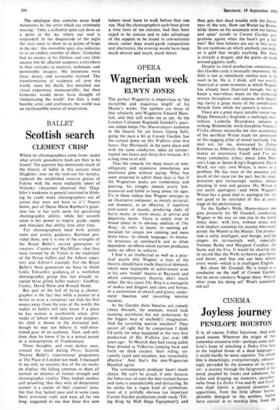OPERA
Wagnerian week
ELWYN JONES
The perfect Wagnerite is impervious to 'the incredible and iniquitous length' of his Master's works. The epithets are those of that scholarly anti-Wagnerite Eduard Hans- lick, and they still strike me as apt. At the London Coliseum Reginald Goodall's spaci- ous tempo keeps The Mastersingers audience in the theatre for six hours. Georg Solti, going the pace a bit at Covent Garden, has the curtain down on Die Walkiire after five hours. Das. Rheingold, in the same place and with the same conductor, takes an uninter- rupted two hours and thirty-five minutes. It's a long time to sit still.
That the rewards for these hours of non- obligatory and expensive immolation are enormous goes without saying. What few seem prepared to admit these days is that if the Wagnerian peaks are tremendous and piercing, his troughs remain pretty low- pressured and liable to hang about for ages. It's in these valleys that Wagner emerges as an illustrative composer, as merely pictorial, not dramatic, as an effective, if repetitive over-scorer of moods, producing slabs of hurry music, or storm music, or arrival and departure music. There is ample time to brood about mire obvious oddities of The Ring: its relish in incest; its seeming ad- miration for simple low cunning and mere brute force: its cloudy language; its drama- tic structure, so ramshackle and so often dependent on effects which current producers make no effort to achieve.
I find it an intellectual as well as a prac- tical puzzle why Wagner, a man of the theatre, should have made theatrical demands which were impossible of achievement even in his own 'model' theatre at Bayreuth and which contemporary theatres don't touch either. On this count The Ring is a menagerie of snakes and dragons and rams and horses, or a pantomime of dwarfs and giants, under- water beauties and cavorting warrior maidens.
At the Garden these beauties are comely (Anne Howells, for example, would look stunning anywhere) but not underwater by the biggest leap of anybody's imagination. And the cavorting warrior maidens? They cavort all right but by comparison I think I'd settle for what happened at the very first production of Die Walkiire just over 100 years ago: 'In Munich they had young stable boys dressed as Valkyries jumping back and forth on thick carpets; their riding, un- cannily rapid and noiseless, was remarkably effective.' And that's the non-Wagnerian Hanslick
The contemporary producer hasn't much choice. He can't be actual, if only because the behaviour of even the best-trained horses and rams is unpredictable and distracting. So he settles for a vague kind of symbolism, most of it pitifully obvious (an important Covent Garden production credit reads 'Tilt- ing Ring by Hall Stage Equipment), and then gets into dead trouble with the literal. ness of the text. How can Wotan lay Briinn- hilde 'down on the mountain with her helmet
and spear' (credit to Covent Garden pro- gramme again) when she hasn't got a hel- met? But then helmets are out in this cycle. So are rainbows on which anybody can walk; so is gold that weighs anything. But there is already a dragon, and the giants do hunk around gigantic staffs.
Despite its timid production compromises, this Garden cycle is musically impressive. Mr
Solti is not as relentlessly restless now as he used to be. He is, I think, still too overtly theatrical at some moments at which Wagner has already been theatrical enough, but he keeps a marvellous sheen on the orchestral texture throughout and exposes with beguil- ing clarity a great many of the complicated threads from which the pattern is woven.
There are a great many notable voices too. Helga Dernesch's Sieglinde is meltingly mar- vellous; Ludmilla Dvorakova remains a striking Brtinnhilde while Josephine Veasey's Fricka almost reconciles me into acceptance of the sacrifices Wotan made for possession of this nagging pillar of moral rectitude. The men are, for me, dominated by Zoltan Keleman as Alberich, though Martti Talvela makes an impressive Fasolt and I've not many complaints, either, about John Dob- son's Loge or James King's Siegmund. David Ward, our very own Wotan, is more of a problem. He has most of the presence and much of the voice for the part, but his inter- pretation gets increasingly restless, almost pleading in tone and gesture. His Wotan is too easily apologetic—and while Wagner's Wotan has a good deal to apologise for, it's not good to be reminded of this at every stage of the performance.
To the Sadler's Wells Mastersingers one goes primarily for Mr Goodall, conducting Wagner in the way no one else in the world today does: with love, without stress, and with implicit contempt for anyone who won't accept the Master as the Master. The produc- tion is solid, intelligent, and benign, and the singers do increasingly well, especially Norman Bailey and Margaret Curphey, the Sachs and the Eva. It would be churlish not to record that the Wells orchestra gets better and better, and that one can hear almost every word—which is in intelligent English.
But about Mr Goodall. He is listed as a conductor on the staff of Covent Garden, but he never conducts Wagner there. Who or what stops his doing so? Won't somebody tell us?


































 Previous page
Previous page